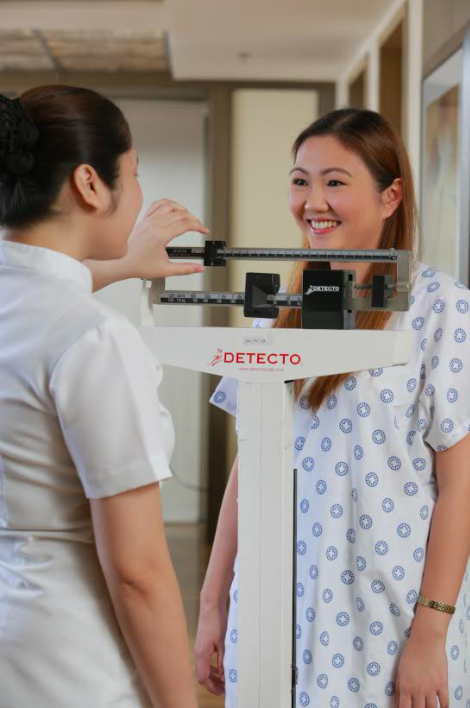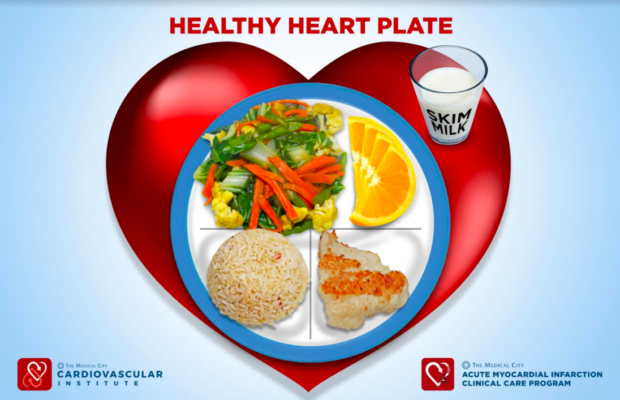Heart disease – Not just a man’s problem
Picture this – a man in his 60s clutching his chest, sweating profusely, and his left arm stiffening, as it is usually portrayed in the movies. We do not usually imagine a woman or a mother, probably in her fifties with abdominal pain, gasping − but without chest pain.
Many women think heart disease is a man’s problem. Not true. Cardiovascular disease, often thought to be a man’s disease, is the main killer of older people of both sexes almost everywhere in the world. In the Philippines, diseases of the heart had been consistently the number one cause of death for several years now. The top three leading causes of death in 2020 were the same as in 2019: ischaemic heart diseases, neoplasms or cancer, and cerebrovascular diseases.

One strategy to prevent heart disease is to maintain a healthy weight. (Photo taken before the pandemic.)
A heart attack happens when the heart’s muscles are deprived of oxygen due to an artery blocked by a blood clot or cholesterol deposit, which prevents blood from flowing through it. The symptoms of heart attack can be different in women. Thus, it is important for every woman to understand the symptoms associated with heart disease.
Women also experience chest pain but they are more likely to experience different symptoms. These include shortness of breath; sweating; new or dramatic fatigue; generalized weakness, dizziness, or light-headedness; nausea with or without vomiting; heartburn, indigestion, or abdominal discomfort, and tightness or pressure in the throat, jaw, shoulder, abdomen, back or arm.
The first step in surviving a heart attack is to identify the symptoms so we can quickly seek help. When it comes to our heart, even subtle or the mildest symptoms can be the biggest indicators.
Time is muscle
Time is muscle. This phrase is often used by cardiologists which means the longer you wait to get someone in for treatment the more damage that can occur to the heart muscle.
In a heart attack, every second counts. A heart attack is a life-threatening emergency that requires quick action. According to Dr. Paolo Prado, Director of the Acute Myocardial Infarction (AMI) Clinical Care Program of The Medical City’s Cardiovascular Institute (CVI), the guiding principle is “time is muscle.” (Acute myocardial infarction is the medical name for a heart attack.) When an artery is blocked, the heart muscle it supplies will die.
“If the artery is not opened quickly, more muscle death occurs and less can be salvaged. If one survives a heart attack without the appropriate and timely treatment, the muscle becomes scarred and there will be complications like heart failure. Appropriate treatment needs to be administered as fast as possible through rapid reperfusion,” said Dr. Prado
He added that the foremost strategy is through “rapid reperfusion,” where a balloon is inserted and a stent implanted to open the patient’s blocked artery in the quickest fashion and time possible after arriving in the Emergency Room. This metric is called the “Door-to-Balloon” time and international guidelines in AMI management recommend that this be preferably done within 60 minutes.
Once successful, secondary steps are taken such as medical therapy, cardiac rehabilitation, education regarding lifestyle changes including diet, exercise, smoking cessation, and attainment of one’s ideal body weight. These measures decrease the chances of having another heart attack in the future.
Heart disease prevention
“We can prevent heart disease by changing our lifestyle and managing risk factors,” said TMC Cardiologist Dr. Ailen Albana Tamargo.
To start, risk factors should be assessed and managed to keep them low. The sooner they are identified and managed, the better the chances of leading a heart-healthy life.
Several risk factors for coronary artery disease such as high cholesterol, high blood pressure and obesity affect both women and men. But in women, other factors can play a bigger role in the development of heart disease. These include diabetes, mental stress and depression, smoking, inactivity, menopause, pregnancy complications, family history of early heart disease, and inflammatory diseases such as rheumatoid arthritis and lupus.
Menopause does not cause heart disease but the decline in estrogen after menopause is said to be one of the several factors in the increase in heart disease risk.
Other risks such as weight gain may also increase around the time of menopause.
Living a healthy lifestyle can help reduce the risk of heart disease. These heart-healthy strategies will greatly help. Eat a healthy diet. Choose whole grains, a variety of fruits and vegetables, low-fat or fat-free dairy products, and lean meats. Avoid saturated or trans fats, added sugars, and high amounts of salt.
Some research has found women to be less active than men. It is recommended to have at least 150 minutes a week of moderate exercise or aerobic activity. That is about 30 minutes a day, five days a week. Dr. Tamargo recommends walking, hiking, dancing, and gardening as forms of exercises.
Maintain a healthy weight. If you smoke, stop. TMC has a smoking cessation program dubbed START ANEW (Smoking & Tobacco Addiction and Relapse Therapy for a Nicontine-Free Way of Life). This program aids smokers in becoming and staying smoke-free, making them better prepared to deal with significant lifestyle changes.
Manage stress. According to Mayo Clinic, long-term stress increases exposure to the stress hormone cortisol and increases the risk of heart disease in women over time. Activities that help ease stress include listening to good music, exercising, doing yoga, and spending time with friends or family.
Limit alcohol consumption. Stick to your treatment plan, take your medications as prescribed (blood pressure medications, blood thinners, aspirin, etc.), and manage current health conditions.
“It is never too late to shed unhealthy habits and lower the chances of suffering a heart attack. It is important to be proactive in reducing our heart attack risk,” said Dr. Tamargo.
“If you think you are having a heart attack, go to the nearest hospital as soon as you can. Do not ride it out at home just because you are scared of contracting COVID-19. Heart attacks still happen even during the pandemic.”
About The Medical City Cardiovascular Institute
The Medical City Cardiovascular Institute fully integrates all the elements of a patient-centered cardiovascular care – from wellness, prevention, diagnosis to treatment and rehabilitation, making it a respected leader in cardiovascular medicine in the country.
For inquiries, please call the Cardiovascular Institute at 89881000 or 89887000 ext. 6314 or visit https://www.themedicalcity.com.
ADVT.
Read more Business stories:
Mesenchymal stem cell therapy in COVID-19 at The Medical City
A love language like no other: Defeating diabetes amid the pandemic
